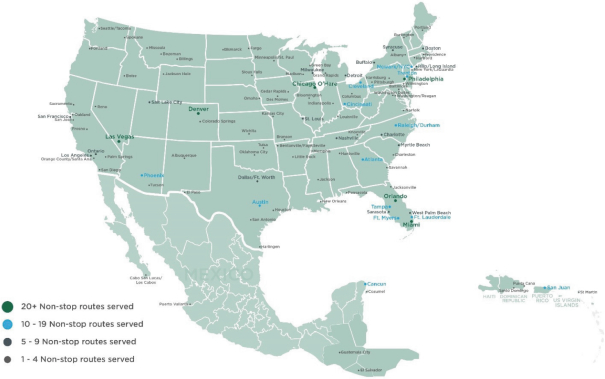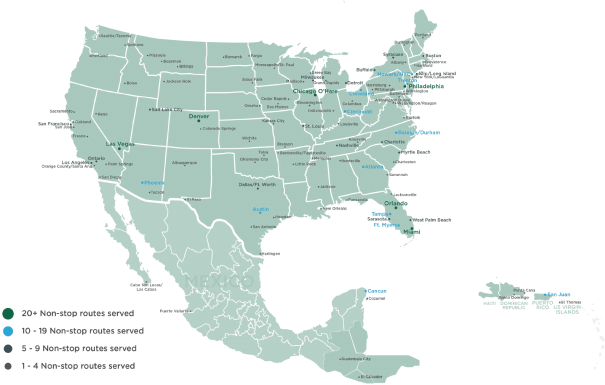network and high daily aircraft utilization rate, the unexpected unavailability of one or more aircraft and resulting reduced capacity or even a modest decrease in demand could have a material adverse effect on our business, results of operations and financial condition.
It has only been a limited period since our current business and operating strategy has been implemented.
Following our acquisition by an investment fund managed by Indigo Denver Management Company, LLC, or Indigo, an affiliate of Indigo Partners, LLC, or Indigo Partners, in 2013 and the implementation of our current business and operating strategy in 2014, we recorded net income of $80 million, $251 million for the years ended December 31, 2018 and 2019 and net loss of $98 million for the nine months ended September 30, 2020, respectively, which, with respect to 2018 and 2019, are higher levels of net income than we had achieved prior to our acquisition. While we recorded an annual profit for the years ended December 31, 2018 and 2019, we cannot assure you that we will be able to sustain or increase profitability on a quarterly or an annual basis. In turn, this may cause the trading price of our common stock to decline and may materially adversely affect our business.
On December 11, 2020, the FDA issued an emergency use authorization for the Pfizer and BioNTech vaccine for the prevention of COVID-19. On December 18, 2020, the FDA issued an emergency use authorization for the Moderna vaccine for the prevention of COVID-19. While it will take time for the vaccine to be widely distributed, we expect confidence in travel to increase as the vaccine distribution occurs, particularly in the domestic leisure market that our business is focused on, and recovery to occur by the second half of 2021.
We are subject to various environmental and noise laws and regulations, which could have a material adverse effect on our business, results of operations and financial condition.
We are subject to increasingly stringent federal, state, local and foreign laws, regulations and ordinances relating to the protection of the environment and noise, including those relating to emissions to the air, discharges (including storm water discharges) to surface and subsurface waters, safe drinking water and the use, management, disposal and release of, and exposure to, hazardous substances, oils and waste materials. We are or may be subject to new or proposed laws and regulations that may have a direct effect (or indirect effect through our third-party specialists or airport facilities at which we operate) on our operations. In addition, U.S. airport authorities are exploring ways to limit de-icing fluid discharges. Any such existing, future, new or potential laws and regulations could have an adverse impact on our business, results of operations and financial condition.
Similarly, we are subject to environmental laws and regulations that require us to investigate and remediate soil or groundwater to meet certain remediation standards. Under certain laws, generators of waste materials, and current and former owners or operators of facilities, can be subject to liability for investigation and remediation costs at locations that have been identified as requiring response actions. Liability under these laws may be strict, joint and several, meaning that we could be liable for the costs of cleaning up environmental contamination regardless of fault or the amount of wastes directly attributable to us.
In addition, the International Civil Aviation Organization, or ICAO, and jurisdictions around the world have adopted noise regulations that require all aircraft to comply with noise level standards, and governmental authorities in several U.S. and foreign cities are considering or have already implemented aircraft noise reduction programs, including the imposition of overnight curfews and limitations on daytime take-offs and landings. Compliance with existing and future environmental laws and regulations, including emissions limitations and more restrictive or widespread noise regulations, that may be applicable to us could require significant expenditures, increase our cost base and have a material adverse effect on our business, results of operations and financial condition, and violations thereof can lead to significant fines and penalties, among other sanctions.
We generally participate with other airlines in fuel consortia and fuel committees at our airports, which agreements generally include cost-sharing provisions and environmental indemnities that are generally joint and several among the participating airlines. Any costs (including remediation and spill response costs) incurred by
33





